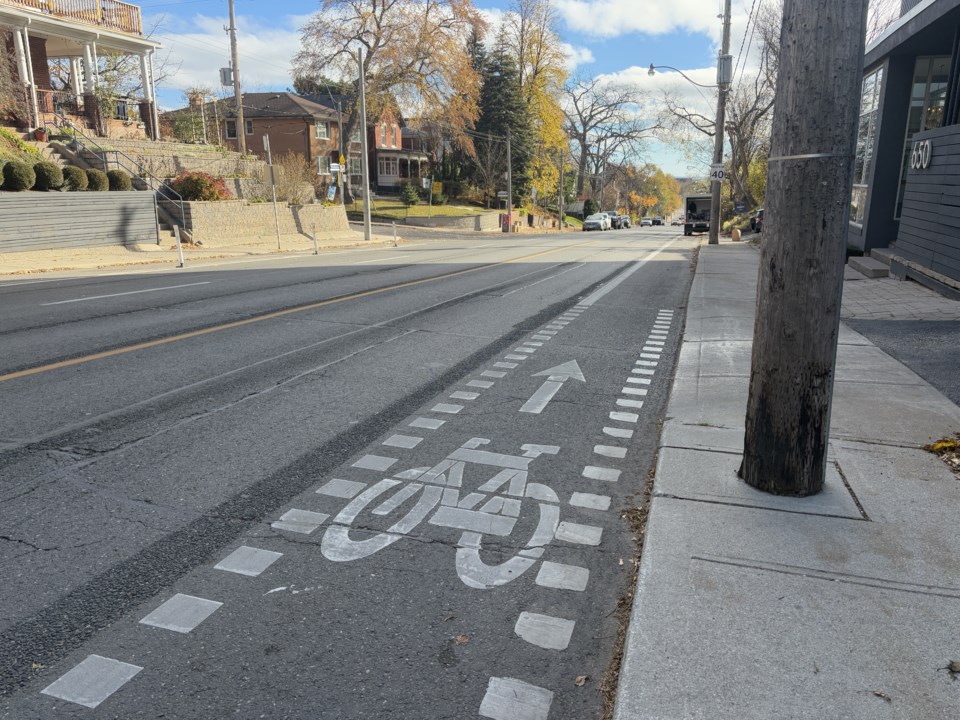After months of heated debate, protests and leaked government documents, three major Toronto bike lanes will be removed as a result of a newly passed, controversial bill from the Doug Ford provincial government.
Bill 212, called the “Reducing Gridlock, Saving You Time Act,” was introduced in late October and was fast-tracked through the legislative process.
The bill was passed on Monday afternoon, officially giving Ontario Transportation Minister Prabmeet Sarkaria the power to begin removing bike lanes along Bloor Street, University Avenue and Yonge Street.
Last week, Sarkaria said “all three lanes could be entirely removed.”
However, the bill does not specify whether the full length of the bike lanes or just sections of those lanes will cease to exist.
Sarkaria’s office said the bike lanes on Danforth Avenue — which turns into Bloor Street west of the Don Valley Parkway — are not immediately on the chopping block.
Bike lane removals could come at Toronto’s expense, despite Sarkaria and Ford previously saying the province would pay. The bill doesn’t require the city to foot the costs but makes clear the province “is not required to reimburse or compensate.”
Toronto city staff released a report on Nov. 13 saying removing the lanes on Bloor, University and Yonge streets would cost nearly $50 million. The report also claimed the removal would seriously disrupt traffic along the streets during road reconstruction.
Premier Ford called the $50-million price tag “hogwash” but hasn’t presented an alternate number.
The bill has allowed the Ford government to lay the groundwork for an early election where driver-centric issues could take centre stage.
In a letter to a Queen’s Park committee, city staff said the removals come at such a high price because they would require “significant roadwork” such as rebuilding recently reconstructed streets and road surfacing.
“Removing the recently improved bike lanes on Bloor Street between Spadina and Avenue Road would require a complete road reconstruction, with multiple phases of intersection and lane closures,” staff said in the letter to Queen’s Park.
“Removing the bike lanes on Bloor, Yonge, and University would not be a short-term inconvenience — we’d likely be facing multiple years of successive construction projects that would disrupt daily commutes, harm businesses, and incur costs, for years to come,” the letter continued.
The bill also protects the government from lawsuits relating to cyclist injury and death after the lanes are removed.
One lawyer, however, said he’s still ready to fight.
“I can assure you that myself and my law firm will do everything possible, legal and otherwise, to ensure the safety of cyclists in this province,” said David Shellnutt, founder of The Biking Lawyer LLP.
The bill puts the brakes on Toronto’s plans to massively expand the city’s bike lane network over the next three years. In June, city council approved a $105-million plan to add 100 kilometres of new and upgraded bike lanes between 2025 and 2027.
If Toronto or any other Ontario city wants to install a new bike lane where a vehicle lane must be removed, provincial approval will be required first, unless construction has already started or contracts have been awarded.
Sarkaria said the province will develop criteria for removals, which could include evaluating how bike lanes affect commute times, but those haven’t been finalized yet.
Whatever criteria are developed might not matter, as the final decision to approve a lane rests with the minister of transportation.
